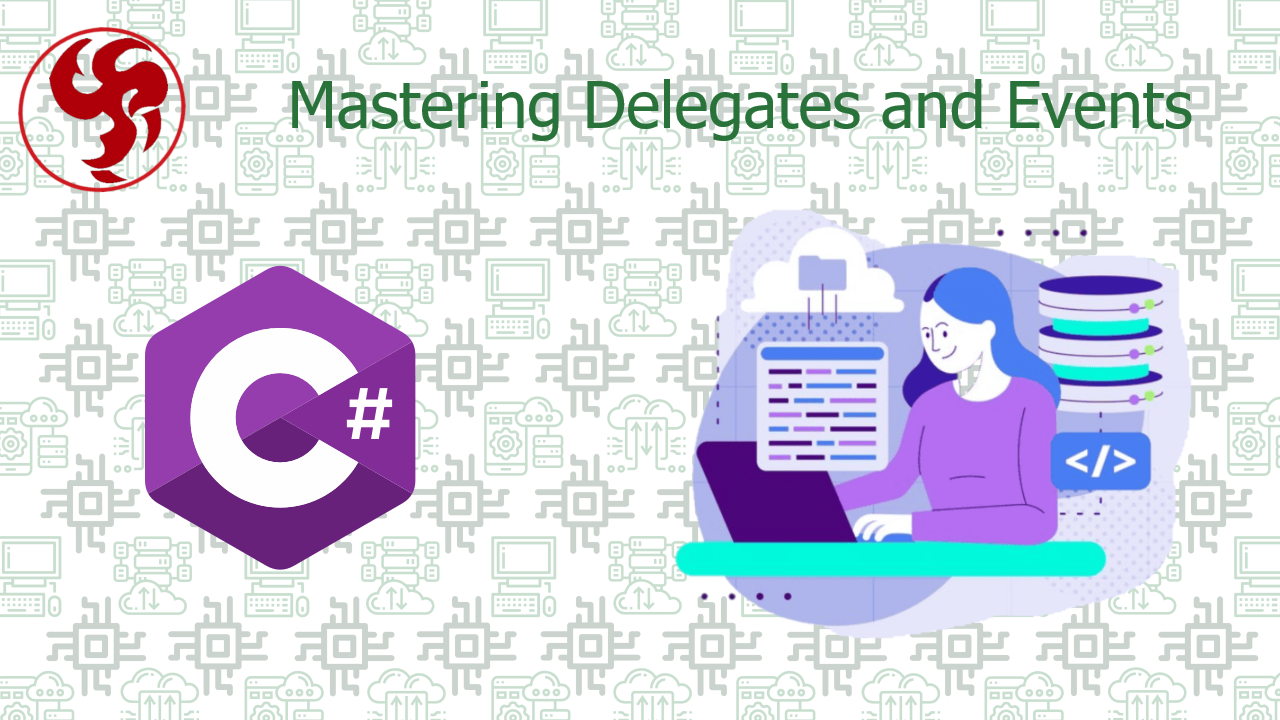Mastering Delegates and Events
In C#, delegates and events form the backbone of event-driven programming, enabling flexible, decoupled architectures that power everything from simple UI interactions to complex distributed systems. While often introduced as "type-safe function pointers," their true potential extends far beyond basic callback mechanisms.
This comprehensive guide will take you from fundamental concepts to advanced implementation patterns, performance optimization techniques, and real-world applications. Whether you're building:
Desktop applications with rich user interactions,
Microservices that need to communicate efficiently,
Game engines requiring responsive event systems,
IoT applications handling sensor data streams,
Enterprise workflows with event-driven business logic,
...mastering these concepts is crucial for modern C# development.
1. Understanding Delegates: From Basics to Advanced Usage
1.1 Delegate Fundamentals: More Than Just Function Pointers
Delegates in C# are type-safe references to methods with specific signatures. They serve as the foundation for events, lambda expressions, and asynchronous programming patterns.
Basic Delegate Declaration & Usage
Key Characteristics of Delegates
Type safety: Compile-time checking of method signatures.
Flexibility: Can reference static methods, instance methods, anonymous methods, or lambda expressions.
First-class citizens: Can be:
Passed as parameters,
Returned from methods,
Stored in collections,
Used in generic algorithms.
Delegate Internals: How It Works Under the Hood
A delegate is actually a class (derived from System.MulticastDelegate) that holds:
A target object (for instance methods),
A method pointer,
An invocation list (for multicast delegates).
1.2 Multicast Delegates: Chaining Method Invocations
One of the most powerful features of delegates is their ability to reference multiple methods through multicasting:
Example: Logging System Using Multicast Delegates
Important Considerations
Invocation Order:
Methods are called in the order they're added.
Use
GetInvocationList()to inspect the chain.
Return Values:
Only the last method’s return value is captured.
For meaningful multicasting, prefer
voidreturn types.
Error Handling:
If one method throws, subsequent methods won’t execute.
Solution: Manually invoke each delegate in a
try-catchblock.
1.3 Built-in Delegate Types: Action, Func, and Predicate
C# provides generic delegate types that eliminate the need for custom delegate declarations in most cases:
| Delegate Type | Signature | Purpose | Example |
|---|---|---|---|
Action | void Method() | For methods without return values | Action save = () => File.WriteAllText("data.txt", "Hello"); |
Action<T> | void Method(T arg) | For methods with parameters | Action<string> log = Console.WriteLine; |
Func<TResult> | TResult Method() | For methods with return values | Func<DateTime> getTime = () => DateTime.Now; |
Func<T1, T2, TResult> | TResult Method(T1 arg1, T2 arg2) | For multi-parameter methods | Func<int, int, int> add = (x, y) => x + y; |
Predicate<T> | bool Method(T arg) | For boolean condition checks | Predicate<string> isLong = s => s.Length > 10; |
When to Use Each?
Action: When you need a void-returning operation (e.g., event handlers).Func: When you need a result (e.g., transformations, computations).Predicate: When you need a true/false condition (e.g., filtering).
2. Events: Robust Notification Systems in C#
2.1 Event Fundamentals: The Publisher-Subscriber Pattern
Events build upon delegates to provide a secure, standardized way to implement the Observer pattern.
Example: Temperature Monitoring System
Key Features of Events
Encapsulation:
Subscribers can only
+=or-=handlers.Cannot invoke the event directly (unlike delegates).
Convention Over Configuration:
- Standard signature:
(object sender, EventArgs e).
- Standard signature:
Null Safety:
?.Invoke()ensures noNullReferenceException.
2.2 Event Accessors: Customizing Subscription Behavior
For advanced scenarios, you can implement custom event accessors to:
Log subscriptions,
Apply filtering,
Manage thread safety.
Example: Validating Subscribers
2.3 Weak Events: Preventing Memory Leaks
Standard event subscriptions can cause memory leaks if subscribers don’t unsubscribe. The weak event pattern provides a solution.
Implementation Using WeakReference
When to Use Weak Events?
Long-lived publishers (e.g., application-wide services).
Dynamic subscribers that may be short-lived.
Plugin systems where unloading is required.
3. Advanced Patterns and Real-World Applications
3.1 Reactive Programming with Delegates and Events
Create event streams for reactive systems:
3.2 Event Aggregators for Decoupled Communication
A central event hub for system-wide communication:
3.3 Asynchronous Event Handlers
Handle events without blocking publishers:
4. Performance Optimization and Best Practices
4.1 Benchmarking Delegate Invocation
| Invocation Method | Speed (Relative) | Use Case |
|---|---|---|
| Direct method call | 1x (fastest) | When performance is critical |
| Single delegate | ~2x slower | General-purpose callbacks |
| Multicast delegate | Linear slowdown per method | Observer patterns |
4.2 Event Subscription Management
Always unsubscribe when subscribers are disposed.
Use weak events for long-lived publishers.
Avoid frequent subscribe/unsubscribe in hot paths.
5. Real-World Case Studies
5.1 UI Framework Event Handling (WPF/WinForms)
5.2 Microservice Communication with Event Bus
5.3 Game Development: Event-Driven Game Logic
6. The Future: Delegates and Events in Modern C#
Delegate covariance/contravariance for flexible signatures.
Local functions as lightweight alternatives.
Records for immutable event data.
Conclusion
By mastering delegates and events, you can:
✅ Build decoupled, maintainable systems.
✅ Implement scalable event-driven architectures.
✅ Optimize high-performance scenarios.
Start applying these patterns today to elevate your C# development skills! 🚀
